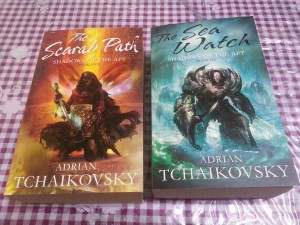The Scarab Path and The Sea Watch are respectively books 5 and 6 in Adrian Tchaikovsky’s Shadows of the Apt series. (You can find my review of book 1, Empire in Black and Gold, here; and my review of books 2-4 here. Start with the first book – individual entries don’t stand alone!) While the two books feature different characters and take place on opposite ends of Tchaikovsky’s world, I’ve chosen to review them together because of how well they cast into relief the author’s strengths – and his weaknesses.
In a nutshell, Tchaikovsky’s strength is his imaginative setting. His brew of magic, steampunk mad science, and creative, insect-themed fantasy races grabbed me from the very first page of book 1; that hold continues in #5 and #6, in which Tchaikovsky takes his characters to new and wondrous locales. Tchaikovsky’s weakness is his tendency to use that fascinating world as nothing more than a backdrop for generic fantasy plots, populated with largely generic fantasy characters.
This is where the difference between #5 and #6 becomes apparent. In #5, Tchaikovsky plays to his strength and avoids his weakness. It is the closest he has come to a character-driven story – while there’s an exciting external conflict plotline, the heart of the novel is about two people trying to cope with the scars left by earlier books – and it works. The resulting sense of depth makes #5 by far my favourite in the series – even if I did giggle at one character’s overly melodramatic fashion sense.
Unfortunately, #6 didn’t live up to that. #6 has a strong middle section in which the characters explore their new surrounds, but my suspension of disbelief was badly marred by a ludicrously slimy early villain who did everything short of tying widows to lightning-powered train tracks. In general, #6 also feels far less character-driven, and far more action-driven, than #5 – in this regard it’s a throwback to the earlier books in the series, and that just isn’t something I enjoy as much as I did #5.
I concluded my review of parts #2-#4 by saying, “I do plan to check out the next book at some stage, and I hope Tchaikovsky learned his lessons.” I don’t think he did – or rather, he did for #5, only to seemingly forget them for #6. That leaves the series as interesting, original, readable beach/airport novels (almost literally – I read #5 and #6 during down time on my travels). Will they ever be more? After six books, I doubt it. But sometimes, a good beach novel is exactly what I need, and when I do, I will happily reach for Tchaikovsky #7.
Resources
Buy The Scarab Path (Book #5) from Amazon US
Buy The Sea Watch (Book #6) from Amazon US






